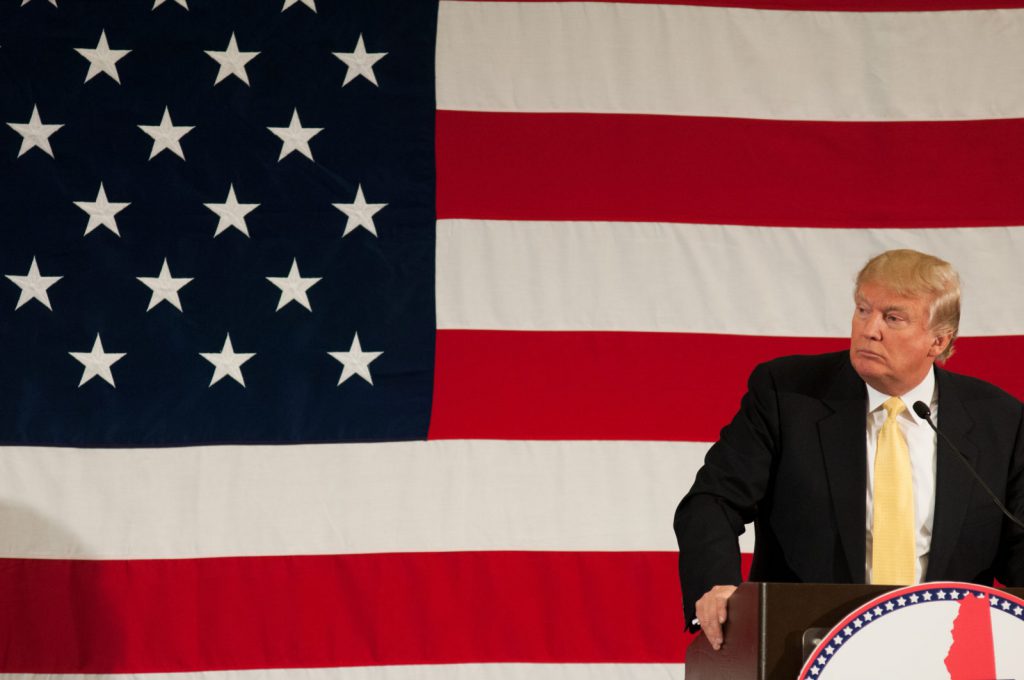
Published December 9, 2015
Donald Trump’s persistent lead in the GOP presidential-preference polls has been a great source of confusion for the chattering classes. But Trump is actually just the latest manifestation of a more global trend: Data suggests the appeal of anti-immigrant policies to working-class voters is much deeper than most American elites want to believe. And because Trump draws the bulk of his support from less-educated, working- and middle-class voters, he may be positioned to do even better still—for now. Polling data from Europe shows that parties with similar voter profiles to Trump’s consistently do better in both online polls and at the ballot box than in live-interview polling. And currently Trump is far ahead online.
Why does this happen? It starts with working-class voters across developed countries being under severe economic pressure because of competition with foreigners at home (immigration) and abroad (EU/trade). They respond to people and parties who tell them this state of affairs isn’t inevitable, and they are often impervious to cries of racism. Their lives are just plain harder than they used to be and working-class voters don’t see elites doing much—or wanting to do much—to make them better. Donald Trump is simply the American version of Nigel Farage, Geert Wilders, and many other European leaders of working-class, anti-immigrant parties who profit from stoking the flames of resentment because there is so much kindling available to light.
So what explains the chasm between these particular candidates’ online versus live polling data? It turns out that a nontrivial share of these same working-class, anti-immigrant voters won’t tell a live person who they support but will share their true feelings when their support is secret—like on Election Day. This is no surprise: Support for immigration and globalization are perhaps the only political sentiments that unite elites from both business and the academy, from right and left. Openly supporting an anti-immigration candidate can risk social opprobrium, ridicule, or worse. In other words, for every group of vocal Trump supporters, there are probably a lot more who just don’t advertise it.
One example comes from the United Kingdom Independence Party, or UKIP, which rose to prominence in the run-up to this May’s general election on a staunchly anti-immigrant and anti-EU platform. Polls there showed that at its height, online and automated polls gave UKIP a third higher level of support (16 percent) than did live-interview phone polls (12 percent). UKIP’s support dropped as Election Day neared, but this online/live-polling gap was evident even in the final polls before Election Day. The final polls from the country’s major online pollsters gave UKIP an average of 14 percent while the phone pollsters gave the party slightly over 11 percent. (The actual results split the difference between the two modes, as UKIP candidates received 12.7 percent of the vote.)
Anti-immigration, working-class parties elsewhere also do better in online polls. Current Swedish polls are divided by mode, too: Two prominent Internet pollsters show the virulently anti-immigrant Sweden Democrats leading with about 27 percent while other live pollsters show it in third place with about 19 percent. Plus, these anti-immigrant parties also typically outperform their final polling averages when the votes are counted. Both the Sweden Democrats and the Danish People’s Party outperformed their respective final-polling averages by about 3 percent in those countries’ most recent general elections, while the True Finns did about 1 percent better at the voting booth than in the polls.
Which is why Trump is on track to do much better than many of his detractors think; he’ll likely be much closer to the Internet and automated polls, where his lead is in the double digits, than the live polls, where his lead is still in the single digits.
This doesn’t mean Trump is on his way to the nomination. Public Policy Polling, an automated robocall pollster, consistently poses hypothetical one-on-one matchups between Trump and other GOP candidates. Though Trump regularly trashes Jeb Bush, Trump loses or runs roughly even with Bush in the Public Policy Polling one-on-ones. And it’s the same with all the other Republican candidates. Even when poll respondents are assured anonymity, there is simply a hard ceiling of support an anti-immigrant candidate can receive. When the field is more limited, Trump loses his edge. (General-election polls also show Trump does worse against the likely Democratic nominee Hillary Clinton than other leading Republican contenders do.)
European election results confirm this observation as well. The anti-immigrant Swiss People’s Party, for example, received a record-high share of the votes in this October’s general election, nearly 30 percent. But that was in the Swiss lower house, the National Council, where seats are awarded via proportional representation. The Swiss Senate, the Council of States, awards two seats per canton, and winners must typically win runoff elections between two final candidates. The Swiss People’s Party gained no seats in the Council of States despite their rise in popularity, because voters from the left, right, and center ultimately coalesced to support candidates from more mainstream parties.
American elites must understand that Trump’s appeal is large and not going away. Working-class voters all over the world are legitimately upset about the turn their lives have taken in the last decade and a half. They are largely not racists, nor are they “fruitcakes and loonies,” as British Prime Minister David Cameron once called UKIP backers. And whether Trump’s support strengthens or fades, the real issue remains: Millions of working-class voters are angry, and their anger is not going to quickly disappear even if their current champion does.
Henry Olsen is a senior fellow at the Ethics and Public Policy Center. He is the coauthor of The Four Faces of the Republican Party: The Fight for the 2016 Nomination.








